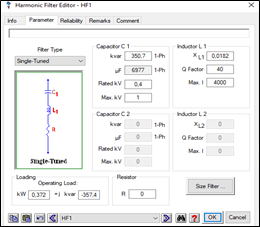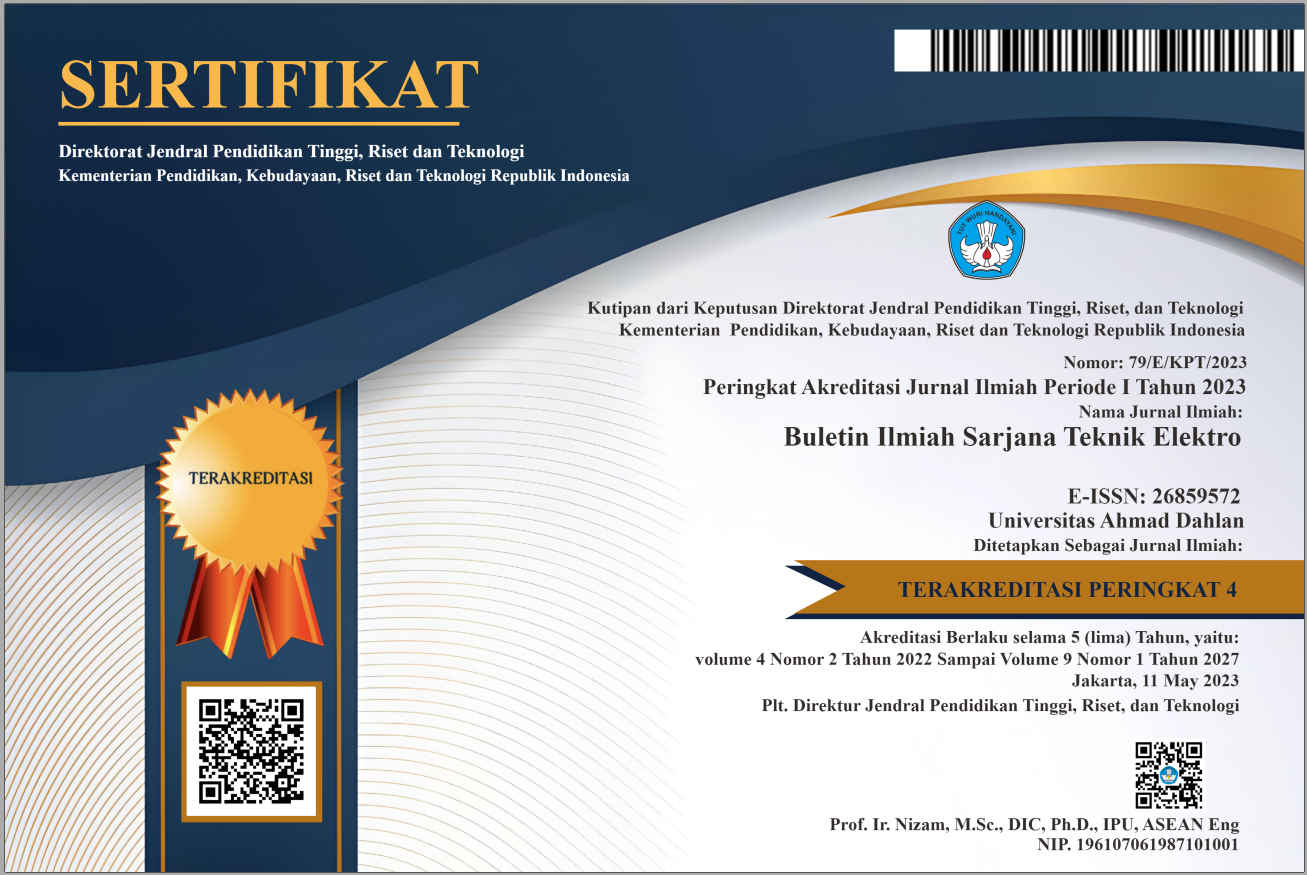Improving Power Quality in High-Rise Buildings with a Single-Tone Passive Filter and Capacitor Bank
DOI:
https://doi.org/10.12928/biste.v6i1.10365Keywords:
THD, Passive Filter, Power Quality, Power Factor, Single-TunedAbstract
Total harmonic distortion and a low power factor are critical issues affecting power quality in modern high-rise buildings. Non-linear loads generated by highly efficient electrical equipment cause total harmonic distortion. On the other hand, low power factor is caused by induction machines, excessively long cables, and inefficient equipment. This research aims to design a single-tunable filter and capacitor bank to address power quality issues. Our method involves utilizing a single-line building design diagram and conducting load simulations using ETAP 19.0.1 software. Our method is a harmonic load flow analysis. We use this method to calculate the harmonic distribution at various points within the electrical network. Harmonic flow analysis aids in identifying the harmonic contributions from various non-linear loads within the system. For research, we implemented a single-tuned passive filter and capacitor bank in the building's electrical system. We initiate the study by analyzing the transformer's total harmonic distortion (THD) and then make iterative adjustments to parameter values until we achieve compliance with the IEEE 519-2014 standard. As a result, the study recommends the installation of two single-tuned filters for orders 5 and 7, as well as the inclusion of a capacitor bank with a capacity of XXX. This reduces the system's THDi value from 21.77% to 4.45% and 22.63% to 4.45%, respectively. The power factor increased from 85.78% to 99.69% and 88.68% to 99.41%, respectively.
References
Ł. Michalec, et al., “Impact of harmonic currents of nonlinear loads on power quality of a low voltage network–review and case study,” Energies, vol. 14, no. 12, p. 3665, 2021, https://doi.org/10.3390/en14123665.
Y.Naderi, S. H. Hosseini, S. Ghassemzadeh, B. Mohammadi-Ivatloo, M. Savaghebi, J. C. Vasquez, and J. M. Guerrero, “Power quality issues of smart microgrids: applied techniques and decision making analysis,” In Decision making applications in modern power systems, pp. 89-119, 2020, https://doi.org/10.1016/B978-0-12-816445-7.00004-9.
W. G. Santika, M. Anisuzzaman, Y. Simsek, P. A. Bahri, G. M. Shafiullah, and T. Urmee, “Implications of the Sustainable Development Goals on national energy demand: The case of Indonesia,” Energy, vol. 196, p. 117100, 2020, https://doi.org/10.1016/j.energy.2020.117100.
M. T. Riaz, M. M. Afzal, S. M. Aaqib and H. Ali, "Analysis and Evaluating the Effect of Harmonic Distortion Levels in Industry," 2021 4th International Conference on Energy Conservation and Efficiency (ICECE), pp. 1-7, 2021, https://doi.org/10.1109/ICECE51984.2021.9406283.
R. Ruliyanta, R. A. Suwodjo Kusumoputro, W. Setyadi, V. V. R. Repi and I. Kusuma, "A Comparative Case Study of Smart and Green Buildings and Their Impact on Power Quality," 2023 10th International Conference on Electrical Engineering, Computer Science and Informatics (EECSI), pp. 66-70, 2023, https://doi.org/10.1109/EECSI59885.2023.10295810.
I. Surya, and J. Kustija, “Dashboard for Industrial Load Control and Remote Power Factor Correction Based on Adafruit's MQTT,” Buletin Ilmiah Sarjana Teknik Elektro, vol. 5, no. 1, pp. 76-85, 2023, https://doi.org/10.12928/biste.v5i1.7494.
R. Ruliyanta, W. Setyadi, and R. S. Kusumoputro, "A Novel of Energy Consumption Profile of a Shopping Center," vol. 5, no. 4, pp. 567–575, 2023, https://doi.org/10.12928/biste.v5i4.9230.
H. K. M. Paredes, D. T. Rodrigues, J. C. Cebrian and J. P. Bonaldo, "CPT-Based Multi-Objective Strategy for Power Quality Enhancement in Three-Phase Three-Wire Systems Under Distorted and Unbalanced Voltage Conditions," in IEEE Access, vol. 9, pp. 53078-53095, 2021, https://doi.org/10.1109/ACCESS.2021.3069832.
M. Tabassum, M. K. Haldar, and D. F. S. Khan, “Implementation and performance evaluation of advance metering infrastructure for Borneo-Wide Power Grid,” Frontiers in Energy, vol. 14, no. 1, pp. 192-211, 2020, https://doi.org/10.1007/s11708-016-0438-2.
K. B. Lindberg, S. J. Bakker, and I. Sartori, “ Modelling electric and heat load profiles of non-residential buildings for use in long-term aggregate load forecasts,” Utilities Policy, vol. 58, pp. 63-88, 2019, https://doi.org/10.1016/j.jup.2019.03.004.
F. Susanto, E. M. Silalahi, S. Stepanus, B. Widodo, and R. Purba, “Simulation of passive filter design to reduce Total Harmonic Distortion (THD) in Energy-Saving Lamps (LHE) and Light Emitting Diodes (LED),” In IOP Conference Series: Earth and Environmental Science, vol. 878, no. 1, p. 012059, 2021, https://doi.org/10.1088/1755-1315/878/1/012059.
C. F. J. Kuo, T. Y. Fang, C. L. Lee, and H. C. Wu, “Automated optical inspection system for surface mount device light emitting diodes,” Journal of intelligent manufacturing, vol. 30, pp. 641-655, 2019, https://doi.org/10.1007/s10845-016-1270-6.
J. Koskela, A. Rautiainen, and P. Järventausta, “Using electrical energy storage in residential buildings–Sizing of battery and photovoltaic panels based on electricity cost optimization,” Applied energy, vol. 239, pp. 1175-1189, 2019, https://doi.org/10.1016/j.apenergy.2019.02.021.
M. P. Thakre, S. S. Sayali and J. A. M, "Stability and Total Harmonic Distortion Analysis with Performance of Grid-Tied PV Systems," 2020 International Conference on Power, Energy, Control and Transmission Systems (ICPECTS), pp. 1-6, 2020, https://doi.org/10.1109/ICPECTS49113.2020.9337036.
S. Shakeri, S. Esmaeili and M. H. R. Koochi, "Passive Harmonic Filter Design Considering Voltage Sag Performance - Applicable to Large Industries," in IEEE Transactions on Power Delivery, vol. 37, no. 3, pp. 1714-1722, 2022, https://doi.org/10.1109/TPWRD.2021.3096461.
R. Setiabudy, I. Surya and H. Herlina, "Phase-Shifting Method with Dy11 Transformer to Reduce Harmonics," 2019 International Conference on Electrical Engineering and Computer Science (ICECOS), pp. 416-421, 2019, https://doi.org/10.1109/ICECOS47637.2019.8984589.
H. Darmawan, M. Yuliana and M. Z. Samsono Hadi, "Realtime Weather Prediction System Using GRU with Daily Surface Observation Data from IoT Sensors," 2022 International Electronics Symposium (IES), pp. 221-226, 2022, https://doi.org/10.1109/IES55876.2022.9888468.
E. Iurie, B. Vladimir and I. Sergiu, "Single Phase to Three Phase Converter," 2019 International Conference on Electromechanical and Energy Systems (SIELMEN), pp. 1-6, 2019, https://doi.org/10.1109/SIELMEN.2019.8905897.
G. Liu, T. Jiang, T. B. Ollis, X. Zhang, and K. Tomsovic, “Distributed energy management for community microgrids considering network operational constraints and building thermal dynamics,” Applied energy, vol. 239, pp. 83-95, 2019, https://doi.org/10.1016/j.apenergy.2019.01.210.
T. A. Jumani, et al., “Computational intelligence-based optimization methods for power quality and dynamic response enhancement of ac microgrids,” Energies, vol. 13, no. 16, p. 4063, 2020, https://doi.org/10.3390/en13164063.
W. K. S. Al-Jubori and A. N. Hussain, "Assessment of Two Load Flow Methods in Distribution Network with Optimal Reactive Compensation," 2021 1st Babylon International Conference on Information Technology and Science (BICITS), pp. 263-268, 2021, https://doi.org/10.1109/BICITS51482.2021.9509930.

Published
How to Cite
Issue
Section
License
Copyright (c) 2024 Ahmad Aminul Kasbi, Ruliyanta Ruliyanta, Adhyathta Keraf

This work is licensed under a Creative Commons Attribution-ShareAlike 4.0 International License.
Authors who publish with this journal agree to the following terms:
- Authors retain copyright and grant the journal right of first publication with the work simultaneously licensed under a Creative Commons Attribution License that allows others to share the work with an acknowledgment of the work's authorship and initial publication in this journal.
- Authors are able to enter into separate, additional contractual arrangements for the non-exclusive distribution of the journal's published version of the work (e.g., post it to an institutional repository or publish it in a book), with an acknowledgment of its initial publication in this journal.
- Authors are permitted and encouraged to post their work online (e.g., in institutional repositories or on their website) prior to and during the submission process, as it can lead to productive exchanges, as well as earlier and greater citation of published work (See The Effect of Open Access).
This journal is licensed under a Creative Commons Attribution-ShareAlike 4.0 International License.


